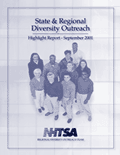
 |
 |
 |
 |
 |
 |
 |
 |
 |
Multicultural Outreach
What You Should Know about African Americans and Safety Belts
-
Recent research demonstrates that minorities are over-represented in motor vehicle crashes.
-
Motor vehicle crashes are the leading cause of death for African Americans through the age of 14. They are the second leading cause of death for African Americans between the ages of 15 and 24, surpassed only by homicides.
-
In 2000, the seat belt use rate among African Americans was five percentage points lower than that for whites.
-
A recent survey showed that 42 percent of minority children (of which African Americans were a part) were at greater risk of air bag related injuries because they were more frequently placed in the front seat of vehicles with passenger-side air bags. By contrast, 15 percent of white children were improperly placed in the front seat of these vehicles.
Good News
-
Safety belt use among African Americans registered a major gain between 2000 and 2002, increasing to 77 percent, an 8 percentage point increase since 2000.
What You Should Know about Hispanics and Safety Belts
-
For Hispanics, motor vehicle crashes are the leading cause of death for ages 1-34.
-
A recent study examined motor vehicle fatality exposure rates and found that, although African American and Hispanic male teenagers travel fewer vehicle miles than their white counterparts, they are nearly twice as likely to die in a motor vehicle crash.
Differential Enforcement
-
The issue of a law enforcement officer stopping a citizen based purely on race or ethnicity, known as differential enforcement or "racial profiling," has recently become an issue in traffic safety.
-
While NHTSA supports the enactment of primary seat belt laws among the States, NHTSA strongly opposes any form of enforcement that uses race or ethnicity as a criterion for stopping a motorist. NHTSA continues to work with the Department of Justice to develop and promote best practices for conducting fair, professional traffic stops. NHTSA also continues to work with its State and community public safety partners to ensure that traffic stops are made for legitimate law violations. NHTSA encourages law enforcement agencies to adopt policies, management practices, training, and community outreach efforts to eliminate differential enforcement.
Multicultural Outreach in Rocky Mountain Region
-
In a Rocky Mountain Region local study conducted by Cordy & Company in 2001, it was observed that fewer than half of African American male drivers and passengers in Denver, Colorado wore safety belts. The state's overall use rate at that time was 72.1 percent. Based on the low use rate, there was a need to develop and implement an educational program that would promote the benefits of wearing a safety belt to this high-risk group. Other issues such as "part time" safety belt use among Hispanic men and women, age 20-35 were of significant concern. Educational programs that target both groups were developed and implemented to encourage safety belt use all the time. The results have been astonishing. For example, the "Brother Keep it Together" program, targeted toward African American males, resulted in a nearly 20 percent increase in safety belt use over a four-month period.
-
The Latin American Research and Service Agency (LARASA) was awarded the Rocky Mountain Region Diversity contract in 2003. The Regional contractor is promoting traffic safety messages through Hispanic community groups and media partners to support the "Click It or Ticket" and "You Drink And Drive. You Lose" campaigns.
Diversity Resources and Publications List
-
 State and Regional Diversity Outreach: Highlight Report - September 2001
State and Regional Diversity Outreach: Highlight Report - September 2001
(PDF Version)African American Yearbook - http://www.africanamericanyearbook.com -
Hispanic Yearbook - http://hispanicyearbook.com
-
Center for Disease Control (CDC)- http://www.cdc.gov/
-
Traffic Safety Digest (TSD) - http://www.nhtsa.dot.gov/people/outreach/safedige/
-
Insurance Institute for Highway Safety (IIHS) - http://www.hwysafety.org/
-
National Traffic Safety Board (NTSB) - http://www.ntsb.gov/
-
Child Passenger Safety Web - http://childsafety.org/
-
International Center for Injury Prevention (ICIP) - www.cipsafe.org/
-
Drivers.com - www.drivers.com
-
National Safety Council - http://www.nsc.org
-
MeHarry Medical College Department of Occupational and Preventative Medicine - http://www.mmc.edu/
-
Blue Ribbon Panel to Increase Seat Belt Use among African Americans - NHTSA Traffic Safety Materials Catalog Ref: # DOT HS 809 185 December 2000
-
National Medical Association (NMA) - http://www.nmanet.org
-
National Center for Statistics & Analysis http://www.nhtsa.dot.gov/people/ncsa/
For more information on State programs, please contact:
